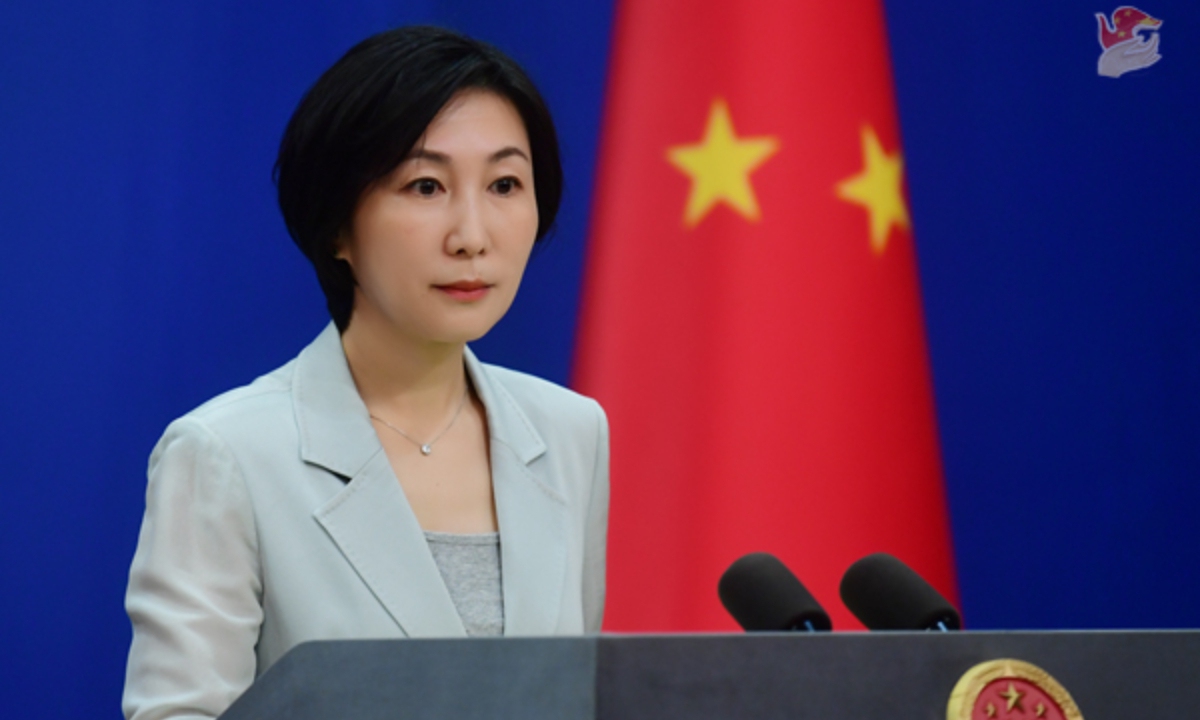China stages strong dissatisfaction, firm opposition against US latest remarks on Article 23 legislation: FM

Foreign Ministry Spokesperson Mao Ning Photo: Ministry of Foreign Affairs
China expressed strong dissatisfaction and firm opposition against US’ latest statement on the Article 23 legislation in the Hong Kong Special Administrative Region (HKSAR), urging the US to respect China's sovereignty, abide by the principles of international law and basic norms governing international relations, immediately stop meddling in China's internal affairs.The US State Department said in a statement on Wednesday local time that it is closely monitoring Hong Kong’s development of national security legislation under Article 23 of the Basic Law and its implications for US citizens, investments, and companies operating in Hong Kong.
“We are particularly concerned by Hong Kong authorities’ proposal to adopt broad and vague definitions of ‘state secrets’ and ‘external interference’ that could be used to eliminate dissent through the fear of arrest and detention,” the statement said.
Completing the Article 23 legislation aims to fill loopholes in safeguarding national security, which is the constitutional responsibility of the HKSAR and a necessary requirement for ensuring long-term stability and prosperity under the framework of “One Country, Two Systems,” Mao Ning, spokesperson of the Chinese Foreign Ministry, said at a press conference on Friday.
The recently concluded public consultation showed strong consensus among various sectors of Hong Kong society on the legislation. The legislation targets a very small number of criminals who seriously endanger national security and will lawfully protect the residents of Hong Kong, Mao said.
With the public consultation period for the Article 23 legislation having ended on Wednesday, local authorities in Hong Kong received 13,147 submissions of opinions as of Wednesday, among which 98.64 percent support the legislation, according to the official data.
While 0.65 percent are purely questions or opinions that cannot reflect the authors' stance and among the 0.71 percent that oppose the legislative proposals, more than 10 are from overseas anti-China organizations or abscondees.
According to the Basic Law of Hong Kong and relevant international conventions, all rights and freedoms enjoyed by residents of Hong Kong are protected, and foreign citizens' investments in enterprises in Hong Kong are also protected by law, Mao said.
She also noted that the extraterritorial application of the Article 23 legislation fully complies with international law and the universal practices of various countries and regions. The definitions of "state secrets" and "external interference" have been fully considered based on the actual situation in the HKSAR and common practices in various countries, and are reasonable, legal, and beyond reproach.
Since the enactment and implementation of the National Security Law for Hong Kong, there has been a period during which Hong Kong has transitioned from chaos to governance and from governance to prosperity, and it is also a period during which the international community has expressed confidence in Hong Kong's future, the spokesperson said.
With the passage of the Article 23 legislation, Hong Kong's high-quality development and high-level opening-up will be better safeguarded, benefiting the vast majority of Hong Kong residents and international investors, the spokesperson said.
Mao also reiterated that Hong Kong is Hong Kong of China, and its affairs are purely China's internal affairs. No foreign country has the right to interfere. We urge the US to respect China's sovereignty, abide by the principles of international law and basic norms governing international relations, immediately stop interfering in Hong Kong affairs, and cease meddling in China's internal affairs.
The US has enacted numerous laws to safeguard national security, yet it hypocritically criticizes and labels the Article 23 legislation, which is blatant political manipulation and double standards, the spokesperson said, urging the US to immediately stop interfering in Hong Kong affairs, and cease meddling in China's internal affairs.
Global Times

